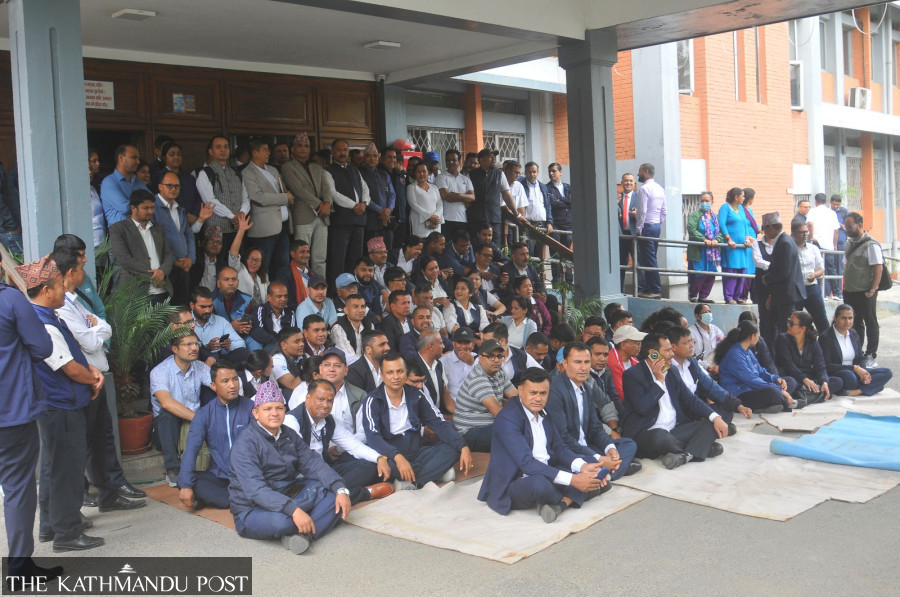National
Civil servants set for new protests as government pushes bill
House committee chair Ramhari Khatiwada tabled the Federal Civil Service Bill in Parliament on Sunday.
Post Report
Trade unions are preparing to resume their protest to press the government to correct the Federal Civil Service Bill, which is presented in the plenary meeting of the House of Representatives for deliberations and endorsement.
Ramhari Khatiwada, chair of the State Affairs and Good Governance Committee, tabled the bill for deliberations in the lower house meeting on Sunday.
Trade unions affiliated to various political parties are launching joint protests against the bill accusing the government of including various provisions that would allegedly cause hindrances in their career development.
Claiming that the bill failed to address their concerns, the unionists are considering resuming their new phase of protest soon.
Yam Bahadur Khatri, chair of the Unified Government Employee Organisation, says the bill fails to include employees of the federal, provincial, and local levels under the definition of federal civil servants; doesn’t address broad career development with a single grade increment and the issue of regularising temporary and contract-based employees within the approved organisational structure; and that the career development path for non-graded employees remains unclear.
“All the trade unions are currently busy in internal meetings to tally the earlier bill related to the Federal Civil Service brought last year with the new one,” Khatri said. “Once they study the bill thoroughly, we will launch a new phase of the protests.”
The erstwhile Pushpa Kamal Dahal government registered the bill in the lower house on March 4, 2024. After theoretical discussions, the House forwarded it to the committee on May 28 last year for detailed deliberations. Lawmakers had proposed a total of 1,583 amendments to the bill.
After a year of discussions on the original bill and the amendments, the committee passed the bill on May 16, which was tabled in the House on Sunday.
The bill becomes law once it is passed by the House of Representatives and the National Assembly and approved by the President.
Ambadatta Bhatta, chair of Nepal National Civil Servants Organisation, stated that further protest programmes will be announced soon. We are currently studying the bill tabled by the government, and prima facie, it does not seem to have come with good intentions.
“Our organisation, along with others, are currently studying the bill,” Bhatta said. “We will have a meeting of the Joint National Trade Union Network on Tuesday and announce a new phase of protest.”
The Movement Directive Committee of the Joint National Trade Union Network, a coalition of trade unions affiliated with various political parties, had earlier called for an indefinite protest programme. A week ago, the agitating civil servants wore black armbands while working at their respective offices to protest against the bill.
The agitating civil servants state that some of the provisions in the bill can negatively impact their promotions and career development. They are demanding that such clauses be removed before the bill is passed by the full House.
As revised by the committee, the bill includes provisions to increase the retirement age from 58 to 60 and maintain a two-year ‘cooling-off period’.
While presenting the bill in the full House meeting, committee chair Khatiwada informed that 47 meetings—including 27 subcommittee meetings—were held over a year to deliberate.
According to him, the committee addressed the proposed amendments, queries from the proposing members, and clarifications from the government’s side.
Khatiwada said the committee made maximum efforts to incorporate amendments aligned with constitutional provisions, spirit, and principles.
“I am tabling the bill to make provisions regarding the formation, operation, and service conditions of the Federal Civil Service,” Khatiwada said while tabling the bill in the House.
Uttam Katwal, acting chair of the Nepal Civil Service Union, accused the committee members of failing to incorporate their concerns despite several rounds of discussions with them on the matter.
They have also demanded that civil servants deputed to provinces and local governments be given a chance of transfer at least once from now on.
Their other demand is automatic promotions for those who have served for five years to a higher level and those who have served for 10 years to a class higher. Two staff hierarchies currently exist in Nepal’s public enterprises and civil service. The new employees’ Act will adopt both.
“The committee did not incorporate our demands in the new draft of the bill,” Katwal said.
Protesting employees claim that the draft law includes a provision to block lower-level staff from promotion for up to 20 years. They demand it be lowered to a maximum of 15 years.




 10.12°C Kathmandu
10.12°C Kathmandu














